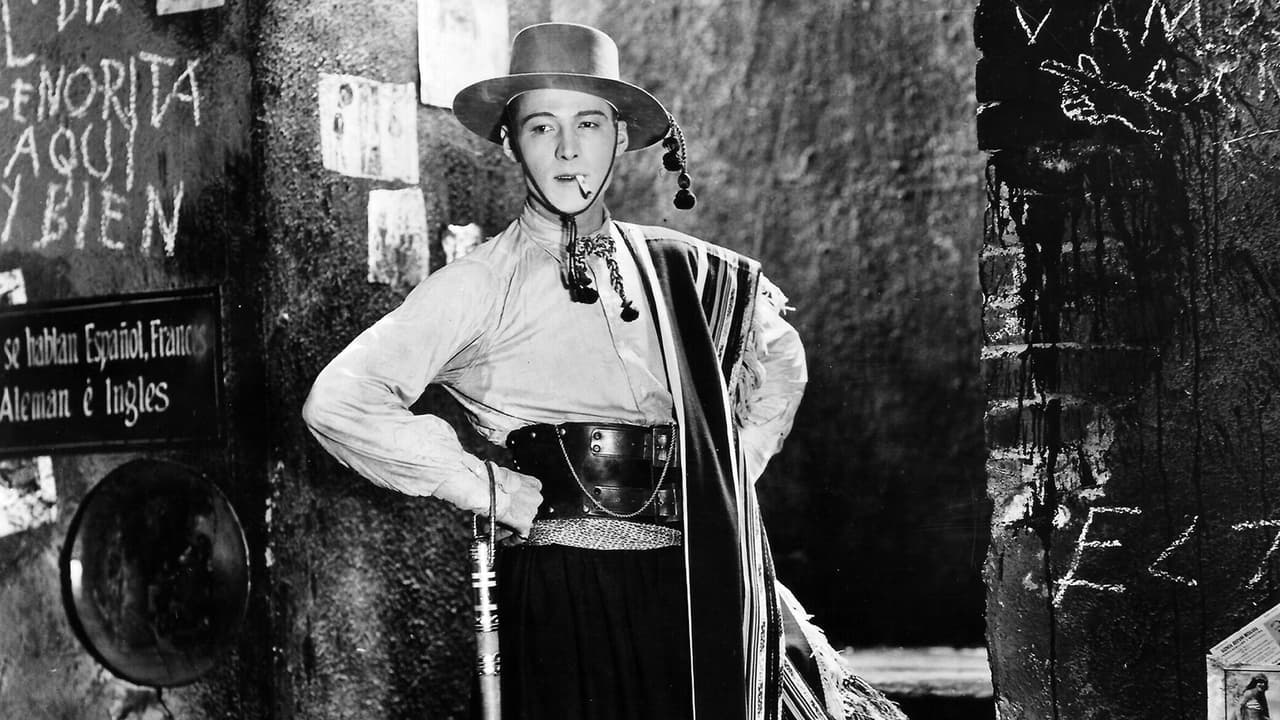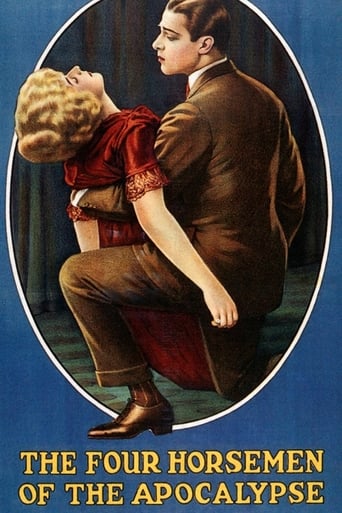

This movie is the proof that the world is becoming a sick and dumb place
... View MoreThis is a tender, generous movie that likes its characters and presents them as real people, full of flaws and strengths.
... View MoreThe film's masterful storytelling did its job. The message was clear. No need to overdo.
... View MoreIt is encouraging that the film ends so strongly.Otherwise, it wouldn't have been a particularly memorable film
... View MoreValentino was in New York when he read in a trade paper that this movies was going to be made. He had already read the book and wanted to play the tango scenes. He had much experience with the Brazilian Tango when he made his living as a "Taxi Dancer" (A dancer that is picked up by a partner and paid for the time he dances with them - like a taxi) in New York. When he came back to Los Angeles to inquire about the tango scene in the movie, he learned that the casting office had been looking for him and already wanted him to play the part of Julio. He was so thrilled! Some people aren't aware that Valentino had come to Los Angeles in the first place because he wanted to work in agriculture. He was tired of taxi dancing and he also had been involved in a scandal in New York that ruined his reputation as a dancer. When he filled out an application to work at Metro studios, the question on the application asked "Why do you want to work in movies?" Valentino wrote the answer "Tired of ballroom dancing." Valentino loved to dance. Many times he kept a dancing job on the side before he was making big money. Then he still danced for fun.
... View MoreThis is surely a visually magnificent film to watch, especially if you get to see a copy of the tinted Photoplay restoration with a great score by Carl Davis.It strikes me however that few commentators here seem to bother about the very nasty portrayal of German people in this film. Despite its claims for universality, condemning WWI in general and not just a single nation (or class for that matter) involved in it, the image of the Germans is no different from the wartime propaganda huns as portrayed by Erich von Stroheim and others. They appear as arrogant, cold, ugly, brutal, grotesque, greedy, militaristic idiots, who even in peacetime in a civilian/family setting march in line and click their heels all the time. Julio's three cousins are portrayed as bespectacled, mischievously grinning jerks who obey their father's commands as if he was an army officer, even as children. They are even shown reading Nietzsche's Zarathustra and it's appraisals of the warrior man as if it was some kind of a bible. A race of villainous, natural born warmongers, it seems. Now this can hardly be the basis for an honest anti-war-movie. Compare this portrayal to the very different, more human and sympathetic image of German people in John Ford's FOUR SONS and of course ALL QUIET ON THE WESTERN FRONT. Despite the now-campiness of these scenes in question I find them still quite offensive and hard to watch, even given that most silent movies made heavy use of strong contrasts and stereotyping. I guess in 1920 the anti-German resentments in the US were still very strong, which even caused D. W. Griffith to absurdly switch a German refugee family in post-war Berlin into a polish refugee family in ISN'T LIFE WONDERFUL - as late as 1924! All this shift from anti-war-intentions to merely anti-German clichés somewhat betrays the "message" of the movie, which admittedly comes across quite rhetorical and pretentious in the first place, and is indeed one of the movie's weakest and most dated points. It just seems to be tagged onto the Valentino adultery romance story for mere dramatic effect (as in the vision of the Apocalyptic Horsemen and the final graveyard scene). But overall the war theme doesn't really stand in the center of the movie.
... View MoreFour Horsemen of the Apocalypse, The (1921) *** (out of 4) Rudolph Valentino does the tango here and with that one scene he became a household name, one of the biggest stars around and forever put his name in the books of Hollywood legend. The Argentinean Madariago (Pomeroy Cannon) has two daughters; one who marries a a French guy and one who marries a German against his wishes. The French daughter has a son named Julio (Valentino) who quickly because his grandfather's favorite but after Madariago dies, the two families movie back to the husband's home countries and soon afterwards WW1 breaks out. Julio, who lived as a playboy, must choose if he wants to give his lifestyle up and join the war. This legendary film from Rex Ingram certainly lives up to its reputation even though some of the anti-war feelings are a little backwards. There's no doubt the film is against the war but at the same time the film paints Valentino as a coward for not wanting to fight in the war. How can you have an anti-character in an anti-war film being shown as a coward? Outside of that this is a very impressive film and what also impressed me was the tinting used by Ingram. For the most part the film is shown in a brown tint but it also switches back to your typical B&W footage while yet again changing to a red tint for the horsemen scenes. The horsemen scenes are very well done and I thought that the special effects still looked quite good. The few battle scenes in the film look nice as well. The performances are all very good with Valentino giving the best performance I've seen from him in the eight or so movies I've watched of his. He's very good during the romance scenes but he also proves himself quite well in the dramatic department. Cannon, Josef Swickard, Alice Terry and Brinsley Shaw are also good in their roles. Wallace Beery is good in his few scenes as a German officer.
... View MoreI came across this film on TCM while flipping channels, having no idea what it was or who the actors were or how far into the story it was, and not usually having the patience to watch silent films. It was the scene where the young woman is admiring herself in what appears to be a nun's or nurse's dress she must've just put on for the first time, and the young man is troubled, talking with her, and I was caught by her attractive face and the natural acting of both of them, and decided to watch until it got boring. Well, I watched it all the way through to the end more than an hour later. The girl, and the white-haired french aristocrat, intrigued and impressed me the most, and the young man was also very good whenever he was appearing with her. And it was clear from the scene of the invasion of the town, Villeblanch, that this was a very big-budget production, and that the film must have been a very big deal back in its time. The music, which I knew must be a modern addition, was very effective and felt just right. I was amazed at the emotional power of the film, because I have almost never before had a real emotional reaction to a silent film, certainly not for so long a stretch; the stiff acting, or the static camera, or the muddied visuals, or the clumsy pacing always get in the way. From the small-print logo at the bottom of the title cards I learned the film was "Four Horsement of the Apocalypse" (which, as I am no great film history student, I'd never heard of) and as soon as it was over I came to IMDb to learn who the actress was. Imagine my surprise to discover the young man was Valentino! The girl was Alice Terry, a name I vaguely recognized; she was really a wonderful, emotionally powerful actress. This is the first silent film I've seen that gave me a glimmer of how the people back in the days of silents could have thought silent film acting was better than talking film acting; when Valentino and Terry were together it was like they could communicate by telepathy -- words would only get in the way. (I just saw Singing in the Rain again last night, which involves the film industry in the moment of transition from silents to talkies). One of the techniques that made this film work, I think, was the fleetingness of the emotional images: the face of the actor or actress would catch the emotional expression in close-up, and often, almost immediately the film would cut to a title-card or another shot. This avoided the unnaturally-long holding of an expression on the face that makes so many silent films feel false. I suppose to most directors in those days, and to self-centered actors, the idea was, the producer is paying so much to get that face on the screen, better to leave it up there as long as you can. But in real life emotions flash onto and off of our faces so quickly, some of the most powerful communications are made in the shortest instants. The editing in this film, at least in the last half (I've never seen the first half) understands that.
... View More